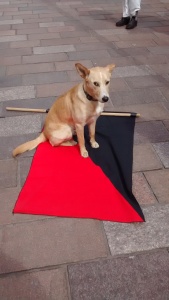What follows is the very rough notes that where used for the introduction to the the first of our Angry Not Apathetic discussion groups. This evening we looked at what elections are, and the role of parliamentary/representative democracy. It would be great to carry on what was a really engaged discussion, so if you were at the talk (or even if not) it would be awesome if you could put a summation of any points you either raised or took away in the comments bellow.

This is what democracy looks like?
The general election is a contest to see who will win the job of running the state, so to understand elections, you need to understand the role of the state:
- An organisation of all the lawmaking and law enforcing institutions within a specific territory.
- Controlled and run by a small minority of people.
- Claims that only violence that takes place with it’s sanction is legitimate.
- Acts to protect the capitalist interests of a specific segment of the ruling class, while also keeping capitalism in check so it doesn’t all fall apart, as the success or failure of a state rests on the success or failure of capitalism within it.
- To maintain social order and class society.
There are a whole lot of reasons thrown up for why elections make sense, none of which stand up to even a light level of scrutiny. Here are some of the most common:
Standing in elections gives a platform to talk politics
This was the reasoning behind the German socialist parties in the early 20th century, it has been the call of many small minority parties since, and today it is used by the anarchist group Class War. The thing is it wasn’t taking part in electoral politics that contributed any success these groups had, it was direct action at the points where we had struggles in our lives. If anything for CW formal involvement in elections has weakened their argument and made their position seem contradictory and muddled, while socialist parties just get trapped in a mire of elections and don’t go beyond that. Politics and power isn’t external in the state, it is everywhere and available to us, and pretending that elections are special hides that power from us.
Voting for the lesser of two evils
No matter who you vote for, the government that forms is going to undertake the same tasks. It may present them differently; in fact New Labour were able to be far harsher than he Tories due to the lack of criticism and scrutiny given to them by the unions. Parties outside of power will always be able to look better than those in. When we look at the policies and actions of government they have never been taken in direct reply to an election so much as the militancy and power of working class movements at any given time. Rather than pretend that elections have any real meaning we should look at ways or organising ourselves so that no mater who is in power, they will need to provide concessions to us as a working class.
A radical minority can pull the state leftwards
Nah, the ruling party will spin things to justify the plans it was going to undertake whatever. A radical minority will be ignored as it can’t be used to further the agenda of those in power (unless painted as a scapegoat and villain – red scare). On the other hand a minor far-right party (such as Golden Dawn or UKIP) can be used as the excuse to drive through harsh laws and reactionary positions because that is what the government wanted to do all along. BNP got used this way without even having an MP.
We need to change the way we vote!
The voting system being the used isn’t the barrier or the key to change. No matter how they are chosen, elected officials are largely unaccountable except to their own party and the tasks of government. Regardless of how they are selected, the main way to see real changes is through organising with those around us, while the electoral process itself is still a massive distraction from building this kind of working class power.
We need to counter voter apathy
This one is half-right. Apathy is a problem, but voting or not voting is beside the point. Apathy comes from a feeling that change is not possible, a feeling that the focus on voting creates. We need to work to build a culture where people feel they can resist the state and capitalism, but that won’t happen by posing a new candidate to vote for; that will only breed more apathy.
We can change the system from the inside
The closer a group gets to executive decision making the more it’s interests start to side with the status quo. We can see this recently with the SNP, where they dropped their pledge to leave NATO, thus indicating to others in power that their commitment to scrap trident is nothing more than hollow rhetoric and that once in power they would (with a regretful face on) keep things as they are.
In Conclusion: I’d argue that anarchism should be a tool for understanding how power and hierarchy works, and as such we should use it to be truthful about elections and work to demystify them. Pretending they are somehow important just holds us back.
Next month (on the 15th of April) we will be looking at the question of what anarchists actively put their time into, so keep your eyes peeled on this blog for details of our second talk in this short series: Direct action gets the goods!


























